LGBTQI+
LGBTQI+
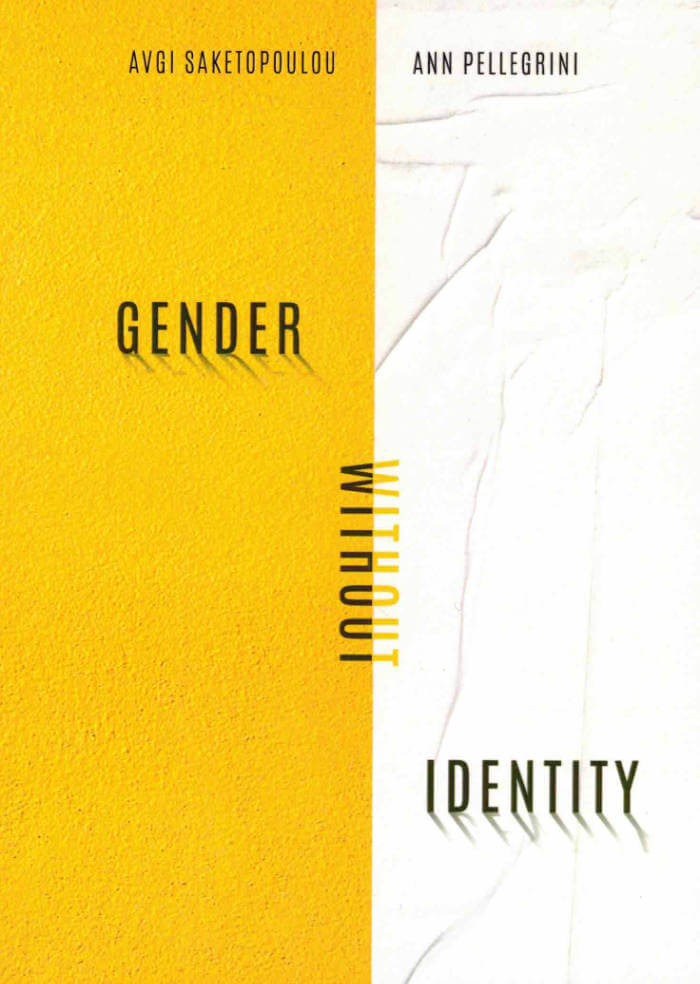
Gender Without Identity
Avgi Saketopoulou, Ann Pellegrini
Gender Without Identity offers an innovative and at times unsettling theory of gender formation. Rooted in the metapsychology of Jean Laplanche and in conversation with bold work in queer and trans studies, Avgi Saketopoulou and Ann Pellegrini jettison "core gender identity" to propose, instead, that gender is something all subjects acquire — and that trauma sometimes has a share in that acquisition. Conceptualizing trauma alongside diverse genders and sexualities is thus not about invalidating transness and queerness, but about illuminating their textures to enable their flourishing.
Written for readers both in and outside psychoanalysis, Gender Without Identity argues for the ethical urgency of recognizing that wounding experiences and traumatic legacies may be spun into gender. Such "spinning" involves self-theorizations that do not proceed from a centered self, but are nevertheless critical to psychic autonomy. Saketopoulou and Pellegrini draw on these ideas to offer clinical resources for working with gender complexity and for complexifying (what is seen as) gender normativity.
Avgi Saketopoulou is a psychoanalyst in private practice in NYC, and a member of the faculty at New York University's Postdoctoral Program in Psychotherapy and Psychoanalysis. She is the author of Sexuality Beyond Consent: Risk, Race, Traumatophilia from the Sexual Cultures Series, NYU Press.
Ann Pellegrini is Professor of Performance Studies & Social and Cultural Analysis at New York University, and a practicing psychoanalyst. Their books include Performance Anxieties: Staging Psychoanalysis, Staging Race and Love the Sin: Sexual Regulation and the Limits of Religious Tolerance (coauthored with Janet R. Jakobsen).
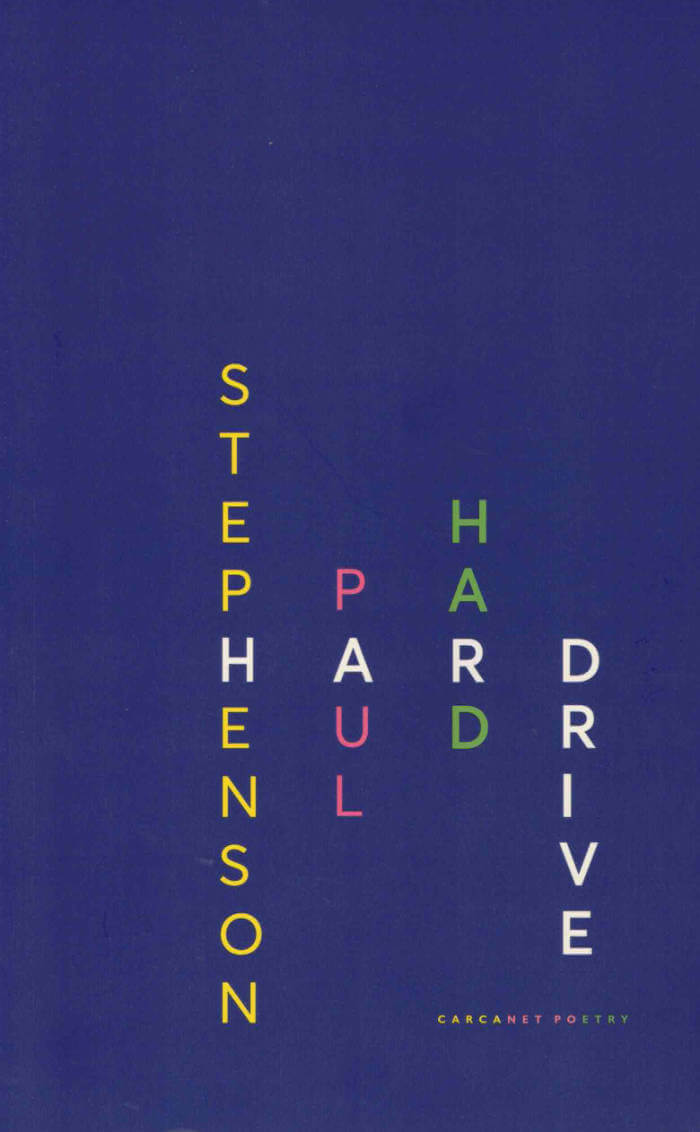
Hard Drive
When his partner suddenly died, life changed utterly for Paul Stephenson. Hard Drive is the outcome of his revisiting a world he thought he knew, but which had been upended. In poems that are affectionate, self-examining, sometimes funny and often surprised by grief in the oddest corners, the poet takes us through rooms, routines, and rituals of bereavement, the memory of love, a shared life and separation. A noted formalist, with a flair for experiment, pattern and the use of constraints, Stephenson has written a remarkable first book, moving and, despite everything, a hopeful record of a gay relationship. It is also a landmark elegy collection.
Paul Stephenson studied modern languages and linguistics. He has published three pamphlets: Those People (Smith/Doorstop, 2015), which won the Poetry Business pamphlet competition; The Days that Followed Paris (HappenStance, 2016), written after the November 2015 terrorist attacks; and Selfie with Waterlilies (Paper Swans Press, 2017). In 2013/14 he took part in the Jerwood/Arvon mentoring scheme and the Aldeburgh Eight, before completing an MA in Creative Writing (Poetry) with the Manchester Writing School. In 2018 he co-edited the ‘Europe’ issue of Magma (70) and currently co-curates Poetry in Aldeburgh. He is a university teacher and researcher, and lives between Cambridge and Brussels.
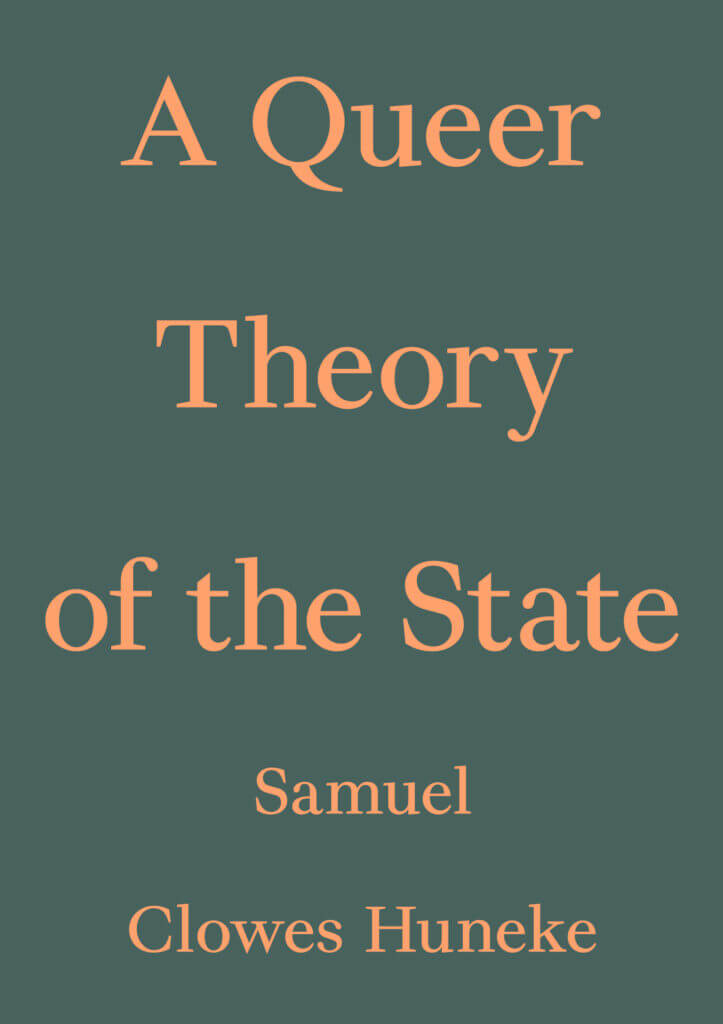
A Queer Theory of the State
How queer theory can wed its critically anti-normative impulses to the empirical need for a state.
Queer theory has often been hesitant to align itself with a politics of the state, approaching it with a negative or pragmatic framework. A Queer Theory of the State offers a more optimistic perspective. Rather than eschew engagement with democratic theorizing, the historian Samuel Clowes Huneke asks how queer theory can wed its critically anti-normative impulses to the empirical need for a state. In answering this question, Huneke shows how the state is an integral component of a politics that seeks to subvert and undo the oppression of queer lives.
Samuel Clowes Huneke is assistant professor of history at George Mason University. His first book, States of Liberation: Gay Men Between Dictatorship and Democracy in Cold War Germany (2022), won the Charles E. Smith Award for best book in European History from the European History Section of the Southern Historical Association. Huneke has written for Boston Review, the Washington Post, The Point, and the Los Angeles Review of Books.

Whore Foods, Chroniques d'une caissière en chien
LA Warman transforme les rayons d’un supermarché bio en boîte à fantasmes. Des clientes frustrées aux collègues en chaleur, de la boucherie au bar à fruit, de l’orgie à la pause dej’ au booty call dans la chambre froide, chaque recoin du supermarché est propice aux expériences sexuelles de la protagoniste.
Extrait :
« B fait une liste de choses à lécher :
— Du 100% coton, des contenants en plastique fraîchement sortis du lave-vaisselle, tout type de marbre, de la papaye (évidemment,
donner une pichenette aux pépins
avec la langue), des sacs en
plastique remplis de raisin,
n’importe quelle feuille
d’arbre.
— Qu’est-ce que tu lèches
d’autre B ?
— Les pommes, les huîtres,
les prunes, certains
métaux, le pudding, le
lait, les confettis, les vieux
bouts de papier (...) »

Nice: Collected Poems
Collected for the first time, four landmark works of queer experimental poetry by reclusive cult poet David Melnick, known for his prowess with invented language and sound poetry.
David Melnick's Nice: Collected Poems spans twenty crucial years of gay life and experimentation with poetic form, bringing together four masterworks of American literature: Eclogs (1967-70), ten episodes in the urban afterlife of pastoral; PCOET (1972), written in an unknown tongue, verse for a world that's yet to be; Men in Aida (1983-85), Melnick's masterpiece, a giddy epic of queer community; and A Pin's Fee (1988), a backward glance and elegy, a cry of pain, howl of anger.
David Melnick was born in Illinois in 1938 and raised in Los Angeles, educated at the University of Chicago (where he studied with Hannah Arendt) and the University of California at Berkeley. Although he spent time in France, Greece, and Spain (whence his mother's ancestors emigrated in 1492), most of his adult life was centered in San Francisco. For an author's note he once wrote, "This poet's politics are left, his sexual orientation gay, his family Jewish.... He is short, fat, and resembles Modeste Moussorgsky in face and Gertrude Stein in body type and posture." A participant in the Free Speech movement, Melnick was a key member of G.A.W.K. (Gay Artists and Writers Kollective) and an early inspiration to the Language Poets. His masterpiece, Men in Aida, began in a reading group organized by Robert Duncan. Melnick passed away in 2022, a day before his 84th birthday.

Chesil Cliff House and other failures
Orbiting around the saddest house in the history of Grand Designs, Sam Moore’s Chesil Cliff House and other failures takes us to North Devon where, standing at the cliff’s edge, we meet Edward Short: a man with a Fred Perry shirt and a dream. Amongst a chorus of characters including Kevin Mcloud as Father Time, Moore by means of Short leads us into a study of creative failure, gender, and, ultimately, the desire to keep writing.
"I struggle to see anyone living here. It feels like a distorted wonder of the world, a cautionary tale. Something that could never have been lived in, but that had to be made."
About the author:
Sam is a writer, artist, and editor. They are the author of All my teachers died of AIDS (Pilot Press), Long live the new flesh (Polari Press), and Search history (Queer Street Press). They are one of the co-curators of TISSUE, a trans reading and publishing initiative based in London.
About A Series of Attempts:
This new series published by Sticky Fingers Publishing explores the essay form through the etymological root of essay: to try, trial or attempt. In 1508, French theorist Michel de Montaigne published a collection of 107 texts called Essais, described by his contemporaries as ‘self-indulgent and embarrassingly confessional.’ It is through these roots we find the attitude and intentions at the heart of this series; that through thinking together, through trying to figure it out on the page, we can reach new and increasingly nuanced ways to understand each other and the worlds we inhabit.

I love you forever is murder
Here, in a work of trans pessimism, amy etherington asks what love and grief mean in a world that wants you dead. Speaking to a structural, architectural violence, I love you forever is murder imagines transness as an exit, which then implies a reentry. Understanding love and grief as inextricably entangled, etherington examines how trans people are often met with grief by those who claim they love them.
Part break-up text, part grief-oriented trans theory, part whispering, pricking, ghostly presence-from-beyond-the-grave, etherington calls upon Lacan through Edelman, Freud, Derrida, and the voices of friends, writing with an aching warmth and confessional intimacy that seeks to live, write, go on, after your own passing.
About the Author
amy etherington is an educator–researcher–writer, exploring grief, death and transness and how they sit by the edges of things. Her writing feels through/with a pessimism that there might only be no place for transexuals in this World, itself an imagining wrought from our violent unmaking. Her teaching work seeks ways to resist the institution a little longer from within its grounds, through collaborative investigation of care and caring practices with students. @amy.ether
About a Series of Attempts:
This new series published by Sticky Fingers Publishing explores the essay form through the etymological root of essay: to try, trial or attempt. In 1508, French theorist Michel de Montaigne published a collection of 107 texts called Essais, described by his contemporaries as ‘self-indulgent and embarrassingly confessional.’ It is through these roots we find the attitude and intentions at the heart of this series; that through thinking together, through trying to figure it out on the page, we can reach new and increasingly nuanced ways to understand each other and the worlds we inhabit.
Sticky Fingers Publishing is an intra-dependant press based in London. We are a feminist, queer, disabled-led publisher producing work at the intersection of design, academia, art, visual culture and performance.
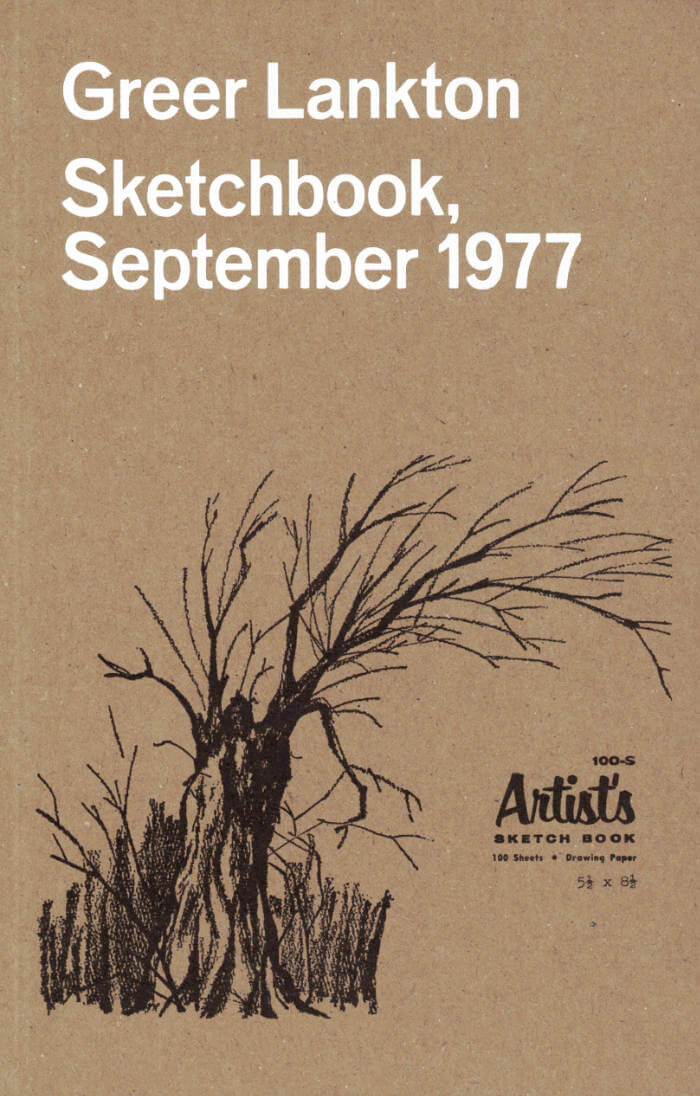
Greer Lankton: Sketchbook, September 1977
A fascinating account of Lankton's inquisitive, sociological and emotional ruminations in advance of her gender-affirming surgery.
This is one of the earliest of Greer Lankton's (1958-96) journals, sketchbooks and daybooks to appear in the artist's archives, and the first to be published in facsimile form. Written during her time as an art student at the School of the Art Institute of Chicago, the journal offers key insights into Lankton's mind at work before her career-defining move to New York in 1978, where she would become an important figure of the East Village art scene in the 1980s and early '90s with her lifelike dolls and theatrical sets.
Containing drawings, behavioral diagrams and aspirational, occasionally confessional writing, the journal is a record of imagining the body and mind reconciled through transformation. In these pages, the 19-year-old turns an inquisitive, sociological eye toward the emotional landscape and somatic effects of the days recorded here; days leading up to her decision to undergo hormone treatment and gender-affirming surgery in 1979. Lankton reflects with raw vulnerability and keen self-awareness on critical questions of self-image, social perception, gender normativity and human behavior.

About Ed
A moving story about love, AIDS, grief, and memory by one of the most adventurous writers to come out of San Francisco's LGBTQ+ scene.
Bob Glück met Ed Aulerich-Sugai in 1970. Ed was an aspiring artist; Bob wanted to write. They were young men in San Francisco at the high tide of sexual liberation and soon, and for eight years, they were lovers, after which they were friends. Ed was an explorer in the realms of sex. He was beautiful, fragile, exasperating, serious, unassuaged. In 1994 he died of HIV. His dream notebooks became a touchstone for this book, which Glück has been working on for some two decades, while also making his name as a proponent of New Narrative writing and as one of America's most unusual, venturesome, and lyrical authors. About Ed is about Ed, who remains, as our dead do, both familiar and unknowable, faraway and close. It is about Bob too.
The book is a hybrid, at once fiction and fact, like memory, and it takes in many things through tales of political activism and domestic comedy and fury to questions of art and love and experiences of longing and horror. The book also shifts in register, from the delicate to the analytic, to funny and explicit and heartbroken. It begins in the San Francisco of the early 1980s, when Ed and Bob have been broken up for a while. aIds is spreading, but Ed has yet to receive his diagnosis. It follows him backward through his life with Bob in the 1970s and forward through the harrowing particulars of death. It holds on to him and explores his art. It ends in his dreams.

Times Square Red, Times Square Blue (Trad.)
Traduction des extraits par Barbara Sirieix & Sabrina Soyer.
How To Become est une maison d'édition autogérée basée à Paris. Nous publions les textes d'auteuces engagés dans des pratiques féministes et peu diffusés par le réseau des grandes maisons d'édition françaises.
Créée en 2016, elle est composée d'artistes et écrivaires en majorité gouines, HTB publie de la litterature expérimentale née d'influences post-post- sapphiques ainsi qu'un choix de tradu d'auteuices non traduites en langue française. HTB s'articule autour d'ateliers d'écriture: How to Become a Lesbian, et d'une revue annuelle publiant les choses issues de l'atelier.

Common Life
A wry, cinematic tour through multiple forms: the poem, the vignette, the play—all set in our laughably lamentable contemporary world.
In three poems, one play, and three short stories, Stéphane Bouquet's Common Life offers a lively, searching vision of contemporary life, politics, and sociality. At a moment at which the fabric of everyday social life is increasingly threatened across the globe, this book is a necessary exercise of the literary imagination: what, it asks, does it mean to inhabit the world together today? With humor and sincerity, Common Life imagines the utopias of collectivity, friendship and love that might enable hope for the present and the future.
Translated by Lindsay Turner

Chi Ban Lon: Queer & Sexuality Lexicon
Chỉ Bàn Lộn is a collection of Vietnamese queer and sexuality slang collected by artist ĐINH Thị Nhung and translated into English while working with Tường Vy and other participants of the Bàn Lộn-Vagina Talks project.
Born in Saigon in the mid-1980s, Tường Vy is a transgender queer who has been subject to a great deal of harassment, especially by the police during gatherings around public gardens. She and her friends’ experiences have led to a rich vocabulary to discuss sensitive topics related to their ‘professions’, preferences, and sex life. The main part of the Chỉ Bàn Lộn lexicon, ‘Saigonese pede 8x’, is related to their creation of linguistic safe spaces, and the rest of the publication outlines different ways to indicate parts of the body and how to talk about sex in the contemporary Vietnamese context.
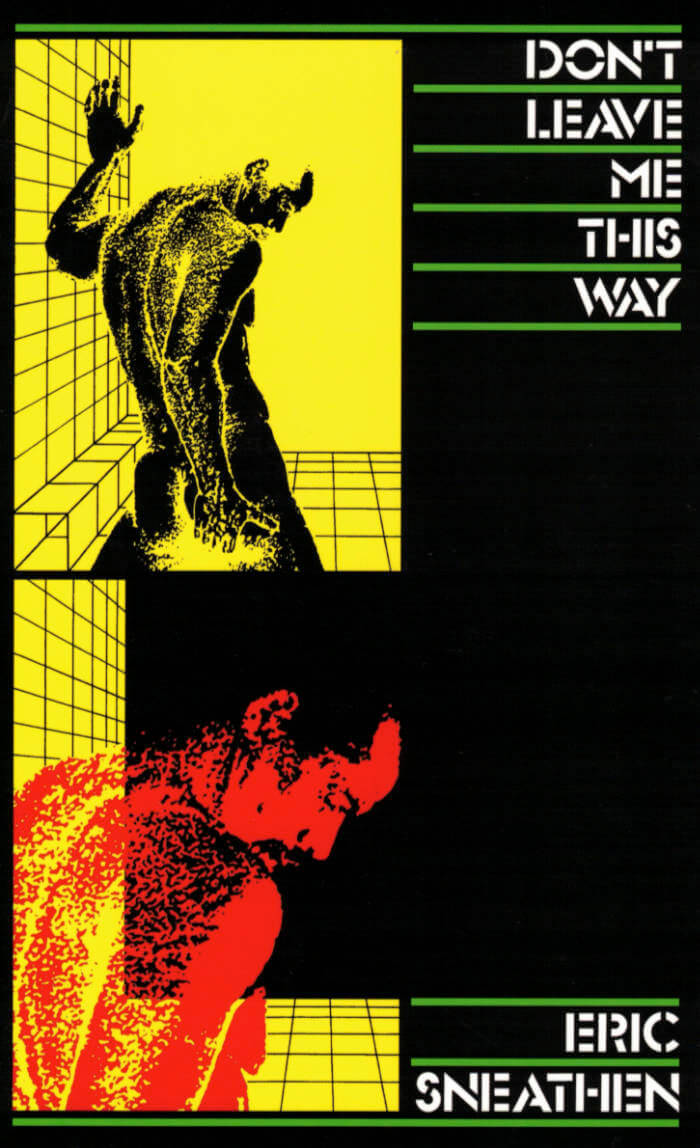
Don't Leave Me This Way
A textual and historigraphical odyssey imbued with queer intergenerational yearning and loss.
Don't Leave Me This Way blends archival research with sexual fantasy to produce a series of sonnets inspired by Gaétan Dugas, named by Randy Shilts as "Patient Zero" of the AIDS epidemic in North America. Committed to the utopian possibilities of elegy and pornography, Don't Leave Me This Way exploits the absurdist beauty of the cut-up technique to voice a chorus of lost spirits: poignant, vengeful, and ready to ball.

Sacred Spells: Collected Works
The collected life-work of an interdisciplinary writer, performer, and central figure in the Black Gay cultural arts and AIDS movements.
In this timely collection of poetry, plays, fiction, and performance texts, Assotto Saint draws upon music and incantation, his Haitian heritage, and a politics of liberation to weaves together a tapestry of literature that celebrates life in the face of death. Influential to contemporary writers such as Essex Hemphill, Marlon Riggs, and Melvin Dixon, Sacred Spells is Saint’s crucial legacy–five hundred incandescent pages of painful, lyric writing that exemplifies the visceral, spiritual dimensions of an artistic practice that’s integral to Black and LGBTQ activist movements worldwide, both historic and present.

Truth & Dare
The debut fiction collection from an inimitable critic, Truth & Dare is a deeply personal and fantastical ride through gender, trauma, queerness, science, history, and religion.
Cornish mermaids take to the football pitch to protest warming seas. Trans students in Manchester searching for the perfect dick accidentally warp the fabric of spacetime. England's worst pogrom comes for York's particle collider, powered by bread and gender energy. On Bournemouth beach, a storm delivers an ancestor across oceans of time to sire a drowning descendant. The devil stands a drink at London's famous gay pub, The Black Cap, while Artemis, in the guise of Joan of Arc, roams a life-or-death night in East Sussex.
Remember the Witchcraft Act of 1927, and the refugees that fled via cinema to defend the Republic of Catalunya? Of course not, it's been written out of history. This is England, (but not?) as we know it.
A queer quantum tour through what was, what is, what could have been and may yet still come to pass, in a collection that braids high-wire believe-it-or-not memoir with cutting-edge science fiction (or is it?) from alternate timelines that vibrate very close to ours. Truth or dare? Both, always.
So Mayer is a writer, indie bookseller, film curator, and pencil stan. Their most recent books are A Nazi Word for a Nazi Thing (Peninsula, 2020), a short essay on queer art, censorship and resistance, and <jacked a kaddish> (Litmus, 2018), a poetry sequence about interwar masculinity, technology and hats, and their BFI Film Classics on Orlando is forthcoming. Their work across genres and forms has been published internationally, including in Roxane Gay's anthology Not that Bad: Dispatches from Rape Culture, in several Criterion DVDs, and in Ignota Press's Spells: 21st Century Occult Poetry. Plus their poetry once appeared on hoardings in Dublin. With Adam Zmith, they collaborated on Unreal Sex for Cipher, an anthology of queer SFFH, and on the BBC Sounds podcast The Film We Can't See, a tour through queer film history.

The Waterfront Journals (US edition)
David Wojnarowicz came to fame in the 1980s as a radical artist whose work challenged the boundaries of art, making him, for a time, the object of Jesse Helms's conservative backlash. Before his death in 1992, he was established as an outspoken AIDS activist, anticensorship advocate, and groundbreaking artist and writer. New York called him a "spokesman for the unspeakable," and The New York Times declared that "his most lasting legacy will be as a writer."
The Waterfront Journals is a collection of his early works of autobiographical fiction. Written as short monologues, each is in the voice of one of the many people he encountered in his travels throughout America in the late 1970s and early 1980s, when he was living on the street.
Wojnarowicz stumbles upon his characters in bus stations, at the side of the road, in hotels, coffee shops, and back alleys, where their interactions are less than epic, but unnervingly intimate. The Waterfront Journals is a testament to their identities, and of Wojnarowicz's grace as a writer.
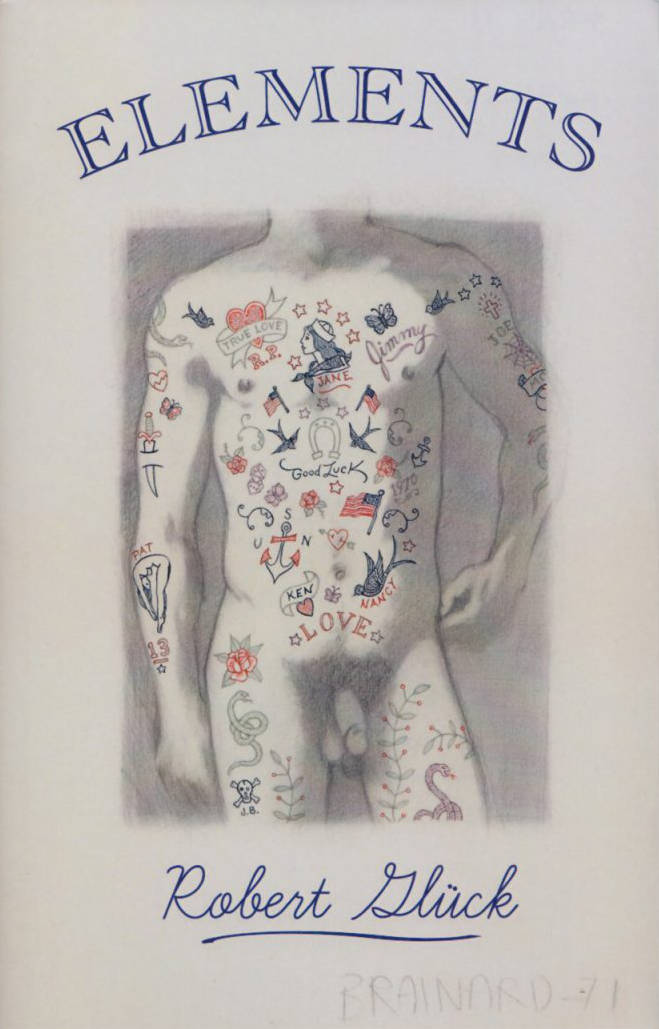
Elements
This collection of stories by Robert Gluck was originally published in 1982 in San Francisco by Four Seasons Foundation under the title ELEMENTS OF A COFFEE SERVICE.
"Bob's fiction is actually quite friendly yet he cuts it with a knife. Bob's gift to the history of letters I think is the uncanniness of his flow. He pulls down the page like a shade, it's masterful what he does. His page is more filled with light than words, really. More filled with temperature too." - Eileen Myles, from the preface to Elements

Chroniques et poèmes sarcastiques à prendre au premier degré d'une gouine peut-être femme peut-être poète
How To Become est une maison d'édition autogérée basée à Paris. Nous publions les textes d'auteuces engagés dans des pratiques féministes et peu diffusés par le réseau des grandes maisons d'édition françaises.
Créée en 2016, elle est composée d'artistes et écrivaires en majorité gouines, HTB publie de la litterature expérimentale née d'influences post-post- sapphiques ainsi qu'un choix de tradu d'auteuices non traduites en langue française. HTB s'articule autour d'ateliers d'écriture: How to Become a Lesbian, et d'une revue annuelle publiant les choses issues de l'atelier.

Le magasin
How To Become est une maison d'édition autogérée basée à Paris. Nous publions les textes d'auteuces engagés dans des pratiques féministes et peu diffusés par le réseau des grandes maisons d'édition françaises.
Créée en 2016, elle est composée d'artistes et écrivaires en majorité gouines, HTB publie de la litterature expérimentale née d'influences post-post- sapphiques ainsi qu'un choix de tradu d'auteuices non traduites en langue française. HTB s'articule autour d'ateliers d'écriture: How to Become a Lesbian, et d'une revue annuelle publiant les choses issues de l'atelier.

Néo-chatte
How To Become est une maison d'édition autogérée basée à Paris. Nous publions les textes d'auteuces engagés dans des pratiques féministes et peu diffusés par le réseau des grandes maisons d'édition françaises.
Créée en 2016, elle est composée d'artistes et écrivaires en majorité gouines, HTB publie de la litterature expérimentale née d'influences post-post- sapphiques ainsi qu'un choix de tradu d'auteuices non traduites en langue française. HTB s'articule autour d'ateliers d'écriture: How to Become a Lesbian, et d'une revue annuelle publiant les choses issues de l'atelier.

Barking Up the Wrong Tree
How To Become est une maison d'édition autogérée basée à Paris. Nous publions les textes d'auteuces engagés dans des pratiques féministes et peu diffusés par le réseau des grandes maisons d'édition françaises.
Créée en 2016, elle est composée d'artistes et écrivaires en majorité gouines, HTB publie de la litterature expérimentale née d'influences post-post- sapphiques ainsi qu'un choix de tradu d'auteuices non traduites en langue française. HTB s'articule autour d'ateliers d'écriture: How to Become a Lesbian, et d'une revue annuelle publiant les choses issues de l'atelier.

Archive Dora Diamant #08
A collection of photographs from the archives of the icon of underground and alternative Parisian nights Dora Diamant.
A self-taught photographer, Dora Diamant has left thousands of photos. The Dora Diamant Association, custodian of this archive, and Éditions L'Amazone have joined forces to bring them to life by devoting a series of publications to them. Each volume of the Dora Diamant Archive was created by a different person and is the result of a subjective selection and arrangement specific to its author.
Figurehead of the Parisian underground and queer nights, photographer, DJ, multimedia and polymorphic artist, Dora Diamant was the daughter of Pascal Doury.
Selected by Sivan Medioni.

Archive Dora Diamant #07
A collection of photographs from the archives of the icon of underground and alternative Parisian nights Dora Diamant.
A self-taught photographer, Dora Diamant has left thousands of photos. The Dora Diamant Association, custodian of this archive, and Éditions L'Amazone have joined forces to bring them to life by devoting a series of publications to them. Each volume of the Dora Diamant Archive was created by a different person and is the result of a subjective selection and arrangement specific to its author.
Figurehead of the Parisian underground and queer nights, photographer, DJ, multimedia and polymorphic artist, Dora Diamant was the daughter of Pascal Doury.
Selected by Yamil Farah and Mélanie Matranga.

Archive Dora Diamant #06
A collection of photographs from the archives of the icon of underground and alternative Parisian nights Dora Diamant.
A self-taught photographer, Dora Diamant has left thousands of photos. The Dora Diamant Association, custodian of this archive, and Éditions L'Amazone have joined forces to bring them to life by devoting a series of publications to them. Each volume of the Dora Diamant Archive was created by a different person and is the result of a subjective selection and arrangement specific to its author.
Figurehead of the Parisian underground and queer nights, photographer, DJ, multimedia and polymorphic artist, Dora Diamant was the daughter of Pascal Doury.
Selected by Leopold Duchemin.